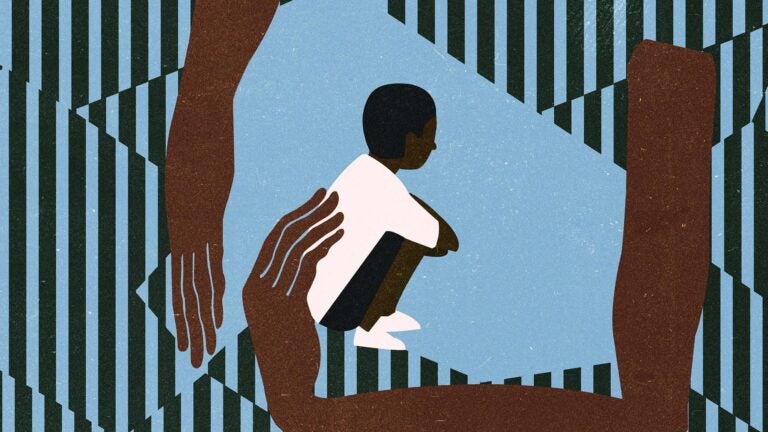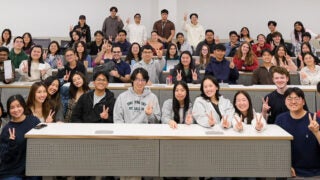
For Black parents, ‘the talk’ binds generations and reflects changes in America
How do you prepare kids to someday be judged by the color of their skin? USC faculty and staff members share how they’ve explained being Black in America to their children.
Whenever Broderick Leaks used to hear about “the talk,” he associated those words with a discussion about the birds and the bees.
But after Leaks had a son, the talk took on a different meaning: how to prepare children of color, and specifically Black boys, for the realities of living in a society amid racism.
As a father, the vice chair of student mental health in the Department of Psychiatry and Behavioral Sciences at the Keck School of Medicine of USC and director of counseling and mental health for USC Student Health, Leaks has personal and professional experience with this version of the talk. He describes it as “prepping your children for the realities of society that they have to navigate.”
“It’s tough because you want them to be kids. You want them to go out and have fun and not stress,” he said. “But you also don’t want to set them up for a rude awakening.”
Different versions of the talk have been around for generations — each one with a specific set of warnings about the times.
For example, Najuma Smith-Pollard remembers her grandfather telling stories about being taught to avoid certain sidewalks and neighborhoods while growing up in Mississippi in the 1940s.
Now the program manager for the USC Cecil Murray Center for Community Engagement, Smith-Pollard thinks back to her time as an associate minister with the First African Methodist Episcopal Church in Los Angeles. Groups of male volunteers used to talk to young Black boys about how to dress, walk and act and to be mindful of how others could perceive them. This was before the city’s 1992 riots.
With today’s prevalence of video technology and the heightened focus on shootings of unarmed Black men, the current version of the talk now focuses more on interacting with law enforcement than avoiding certain neighborhoods, she said.
But regardless of which specific threat is prioritized, she added, the substance of the talk and the reason behind it remain the same: “It is a conversation about safety because we have a profiling problem.”
For Black parents, the talk is about building both awareness and pride
On a certain level, the discussion is universal. Every parent on the planet has to figure out how they want to raise their children. They must decide what kind of values, life lessons and guidance to impart. But when you have children of color, there’s an extra dynamic that parents have to consider.
The talk can bring up tragic realities, especially for Black parents.
“You have this beautiful baby and they have so much promise, and you want them to achieve every hope and dream that they have,” Leaks said. “It’s a weird feeling of all of this joy, and then knowing that it doesn’t matter how smart my son is, it doesn’t matter how brilliant my son is, it doesn’t matter how handsome my son is going to be — some people are going to have a negative reaction just seeing him, and that’s heartbreaking in some sense.”
Stacey Finley, an associate professor of biomedical engineering at the USC Viterbi School of Engineering, is also going through that as a mother. She has two daughters, 8 and 10, and a 1-year-old son. The boy is too young, but Finley and her husband are starting to introduce some age-appropriate concepts to their daughters.
I think we have to be honest and say this is the state of the world we live in.
Stacey Finley
For example, the whole family started rewatching the TV show The Fresh Prince of Bel-Air. They used an episode in which Will and Carlton get pulled over while driving from L.A. to Palm Springs to talk about the importance of being respectful to people of authority.
There was no explicit talk of police brutality or institutional racism, but Finley introduced the concept of how other people might perceive her daughters because of how they look.
“It’s tough to even say that to these beautiful and naïve girls,” she said. But she takes comfort in the fact that she is doing this to protect them.
“I think we have to be honest and say that this is the state of the world we live in,” she said. “As tough as it is, I would rather them be a little disappointed and prepared than go out and experience something and not know how to act.”
The talk is also an opportunity to build up children’s sense of pride by exposing them to the richness of whatever culture they come from. Building up self-confidence is an important aspect of the talk.
“I love being a person of color. I love being Black. I think it’s a wonderful experience, despite the anti-Black sentiment that is sometimes present in society,” Leaks said. Part of the talk also involves imparting a sense of belonging and being part of a loving Black family.
How Black parents traditionally approach the talk
There is no perfect formula for how to have the talk. Research points to five categories of how parents approach the subject:
- Messages of pride in one’s race and culture.
- Teaching about racial inequalities and pointing out imbalances in society.
- Deemphasizing the importance of race and focus on hard work and egalitarianism.
- Promoting mistrust of other races or interracial interactions.
- Silence; simply not talking about it.
Some parents use methods from multiple approaches, while some use none at all, Leaks said.
While there is no singular “best choice,” choosing silence and mistrust categories tends to result in the least effective psychological outcomes, he added. Messages of pride mixed with an appropriate dose of societal issues seem to be the most effective, according to research.
Regardless of the method, lessons learned from the talk stay with people throughout their lives. For example, Timothy Pinkston grew up as a member of the only Black family on the outskirts of a rural Ohio town in the 1970s. He remembers some of his neighbors hanging explicitly racists signs at their homes and using racist slurs in everyday language.
Pinkston — holder of the George Pfleger Chair in Electrical and Computer Engineering and the vice dean of faculty affairs at USC Viterbi — recently described on the school’s Escape Velocity podcast how his parents gave him the talk. They told him to always be polite toward adult white people, to never refer to them by their first name and not to come across so confidently that it could be perceived as “uppity.”
“The talk is about being cautious,” Pinkston said. “But not being overly cautious to the point of cowardly, and that’s the key.”
Those childhood lessons kicked in decades later when Pinkston was pulled over by a police officer while leaving an event on USC’s University Park Campus. The event honored then-LAPD Chief Charlie Beck and other USC honorary degree recipients.
As Pinkston drove his Tesla home, he noticed a police car following him. He pulled into a driveway to allow the police car to pass by, but it stopped behind him. The officer knocked on Pinkston’s window with his hand on his gun and asked what he was doing.
The professor calmly said he had done nothing wrong — and held his temper.
“When he was talking to me, I was very upset,” he said. “But my training reminded me to be polite, to be courteous and not to escalate or to cause any kind of racial or any other kind of tension between me and the officer, because people die from that.”
Parents of children of color ponder how to discuss law enforcement
During therapy sessions with parents of children of color, Leaks has noticed trends absent from his own experience.
For example, Leaks remembers no explicit discussion of death in talks with his parents. Sure, there were conversations about how to be safe and certain areas to avoid, and his parents had him read books about Martin Luther King Jr. and Malcolm X. But parents today worry for the lives of their children, especially their sons.
The students are so smart and bright and passionate. I think they are going to continue the fight.
Broderick Leaks
Finley, who grew up in the Midwest, has noticed the same generational shift in the talk. She believes that the risks involved in interactions with law enforcement have long existed, but people are more aware of them now because video and audio recordings are so common.
The conversation around law enforcement can be tricky to have, Leaks said. On one hand, parents want their children to respect police officers and turn to them for help, but on the other hand, parents want their children to be careful as well.
In Leaks’ case, his brother and uncle are both police officers. When his son was younger, Leaks would introduce him to every police officer they saw on the street to build positive relationships.
This last year, Leaks took his son on student-led protests following the killings of George Floyd and Breonna Taylor. One of the most surprising things about the protests was the amount of diversity he saw in the crowds. He was encouraged to see Black students leading the protests, as well as support from a wide range of allies.
“That is one of the things I am always proud of,” he said. “The students are so smart and bright and passionate. I think they are going to continue the fight.”



